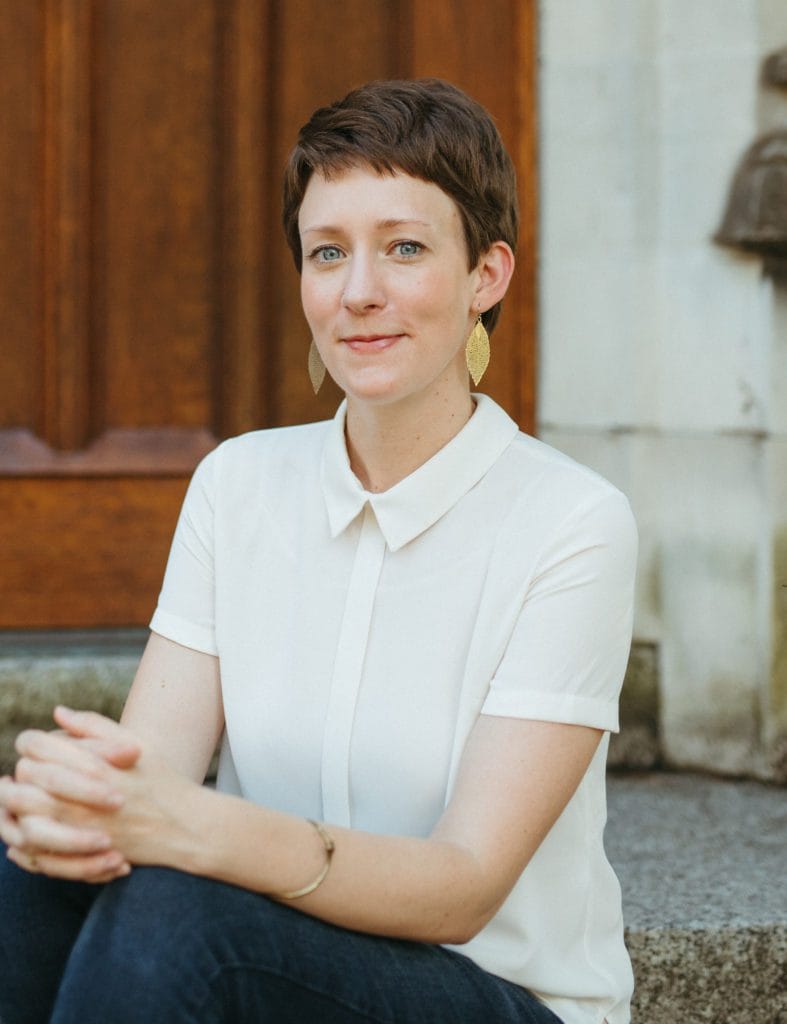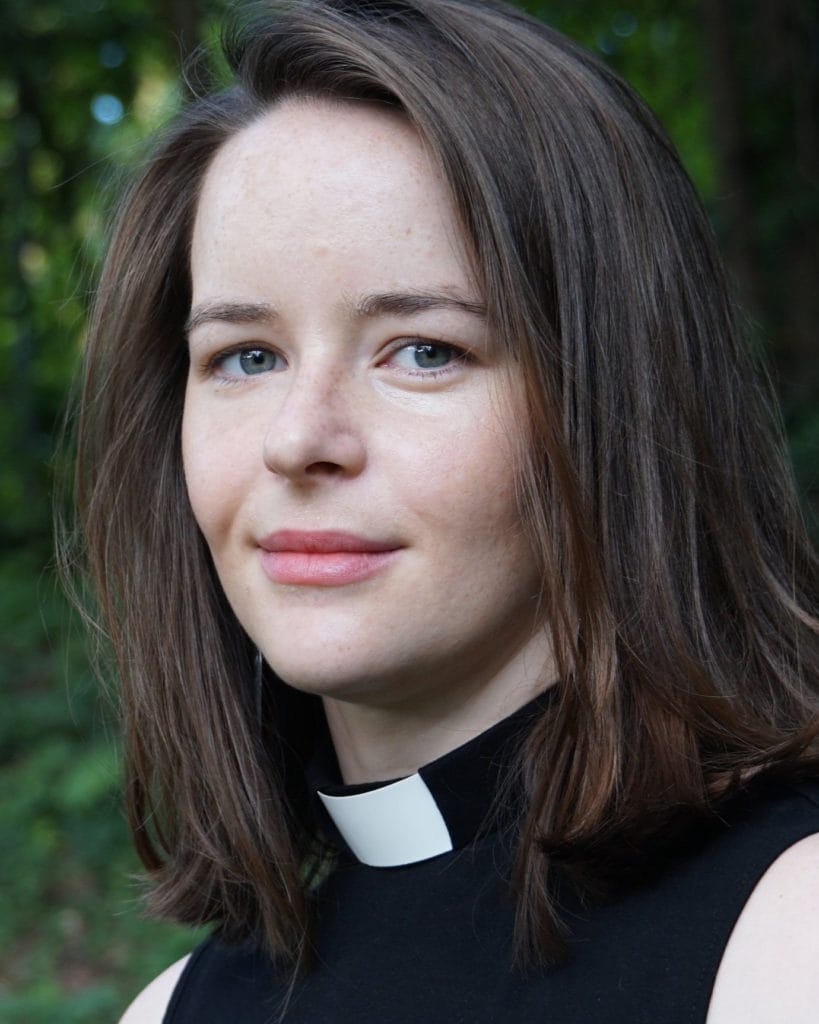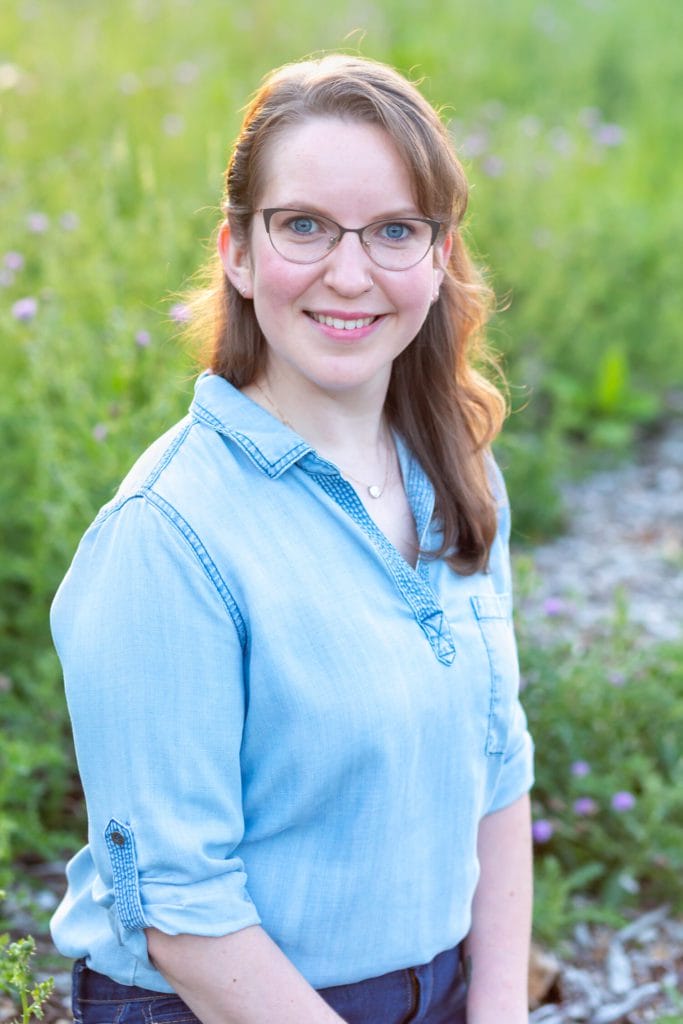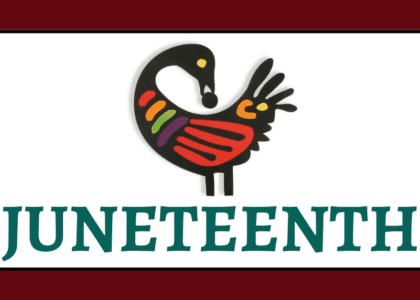by Lauren Plummer
When Rev. Claire Brown’s quarantine puppy ended a nest of backyard baby bunnies, her four year old knew they needed to mark the loss of life with a funeral. As an Episcopal priest, Brown consulted her liturgical resources to create an appropriate ritual to help her child grieve and make meaning. She recounts that all seemed to be going well until a few hours after the funeral when she found her child by the bunny graves, waiting expectantly “for God to raise them from the dead like Jesus.” Alas! Something was lost in translation. This unexpected turn began conversations with others who wade into questions of faith with curious young folks, and together they realized that if a resource for progressive faith formation at home couldn’t be found, perhaps it was time to create it. Soon Brown and Rev. Anita Peebles set to work on writing New Directions for Holy Questions: Progressive Christian Theology for Families.
While a number of progressive church curricula resources and story Bibles exist, Brown and Peebles identified a gap in support for the theological formation that happens at home, and especially in homes in which social commitments like affirming LGBTQ+ families, working for racial justice and environmental justice are inextricable from faith commitments. The book begins with the words, “You are beloved. Beginning, middle, and end,” which provides the lens through which all the questions that follow are examined. It’s deeply rooted in the life and teachings of Christ, and it radiates out from that point into generous and expansive wondering with the Holy at our horizons.
From this stance, New Directions covers the basics with classic categories of systematic theology: Who are God, Jesus, and the Holy Spirit? What is sin? Why did Jesus die? The authors explore other questions young people may have regarding rituals of the church like the meaning of baptism, communion, and prayer. From their wisdom as progressive children’s ministers and caregivers, they also bring thoughtful responses to questions of identity and ethics like, “Who am I?” and “How do we care for each other and creation?”
The book addresses 19 questions about God and faith. Each one begins with a retelling of one or more Bible stories that speak to the question posed, followed by some context and sometimes multiple perspectives on ways different people approach this question. Each chapter includes guiding questions to help readers make connections as they go, a spiritual practice to engage the body in theological exploration, and a “justice story” that illustrates how a person or group has embodied their answers to this question. There is a summary for younger children at the end of each chapter that crystallizes a main point, an activity, and a brief prayer for those early in their journey or adults who want to be prepared with some talking points.
If anyone is looking for easy answers to the sticky God questions children come up with, this is not that book. New Directions is not a catechism. I celebrate this book for the ways the authors have leaned into the ambiguities of faith and leaned into the sacredness of relationships that help us hold and consider our big God questions faithfully. New Directions is addressed to children and written in such a way that kids can read it on their own (roughly ages 6-12), but at its core this book is an invitation to conversation—to all that parents and caregivers might wonder together with the young prophets, healers, teachers, and holy mischief makers in our lives.
Written by a Baptist minister and an Episcopal priest, the theology offered in this book is not tied to any particular denominational affiliation. Brown and Peebles present a variety of interpretations with an openness for readers to bring their own questions, disagreements, or go another direction. With incredible clarity and trauma-informed, developmentally-appropriate language, the authors weave in contemporary stories of people using their gifts for the increase of love and justice in the world. I’m so grateful that my little one will grow up knowing of Sonya Renee Taylor’s work on radical self love, Malala Yousafzai’s advocacy for girls’ education, the Black Lives Matter movement, the liturgical Service of Renaming for transgender Christians, and the Sanctuary Movement, to name just a few, and knowing of these people and movements as stories of God’s love and justice in action.
I read New Directions for Holy Questions (and will reread it many more times) in preparation for questions I expect my toddler to start asking any day now, but I also found myself buoyed by the hope and affirmation I absorbed from these pages. The honesty and artistry with which the authors consider some of our hardest and most urgent questions about suffering, love, and other holy mysteries tended to my spirit, too. As someone raised in a conservative evangelical context, this book is helping me put kid-sized words to theology I’ve only gotten to re-learn as an adult. What a gift! I give thanks for this beautiful, life-affirming conversation guide. I give thanks for the good news it offers to a new generation of Christians and to all those seekers still young at heart. May you read it with the children in your life and know the blessings of asking your holy questions together.

Lauren Plummer is a graduate of Vanderbilt Divinity School. She works as a Marriage and Family Therapist and serves as a newly-ordained pastoral intern at Glendale Baptist Church in Nashville, TN.
About the Authors

Claire Brown is an Episcopal priest, writer, facilitator, and spiritual director. She is a graduate of Vanderbilt Divinity School, the School of Theology at Sewanee, and the Shalem Institute for Spiritual Formation. She currently serves as the rector at St. Paul’s Episcopal Church in Athens, Tennessee.

Anita Peebles serves as associate pastor for next generation ministries at Seattle First Baptist Church (ABC-USA). She is a graduate of Vanderbilt Divinity School, and she was ordained by Glendale Baptist Church in Nashville, Tennessee, an Alliance of Baptists partner congregation.
You can purchase a copy wherever you buy books. Want to know more? The authors have started a podcast to continue the conversation. Visit the website to find more information and listen to the podcast episode that corresponds with each holy question in the book.




Recent Comments